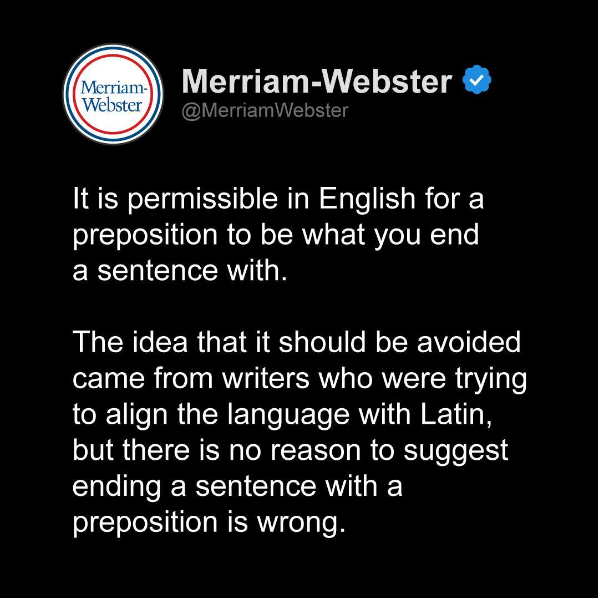< 1 Min Read
Can You End a Sentence With a Preposition? The Debate Heats Up
Can you end a sentence with a preposition?
According to Merriam Webster, the answer is yes.
“It is permissible in English for a preposition to be what you end a sentence with,” the dictionary company recently posted on Instagram.
Not surprisingly, the internet had some strong reactions.
Ending a sentence with preposition has long been frowned upon by English majors and grammatically inclined individuals.
Pro-preposition enders, including Merriam Webster, say the rule is outdated at best and was never relevant or realistic in the first place.
Traditionalists say today’s writers are just being lazy.
The reality is, sometimes ending a sentence with a preposition is awkward, and sometimes rewriting the sentence to avoid it ends up being more confusing.

Rules are Rules (Unless They Aren’t)
So, Merriam Webster gave its official blessing to end sentences with prepositions. But the better question is: Should you?
Communication is all about conveying ideas. If it’s easier to get an idea across by ending with a preposition, it’s probably OK (especially when it comes to spoken communication).
But for some audiences, the perceived grammatical faux pas is all they’ll notice. That puts the message of your communication at risk, and that’s never good for marketing language designed to compel action.
Of course, Merriam Webster’s marketing efforts have a role to play in the debate as well. By posting a grammatical hot take, the brand is taking a position of authority. It’s also drumming up a lot of exposure, including coverage in NPR, Forbes and more.
Of course, MW’s marketing efforts have a role to play in all this as well. By posting controversial questions, the brand gets exposure (including coverage in NPR, Forbes and more).